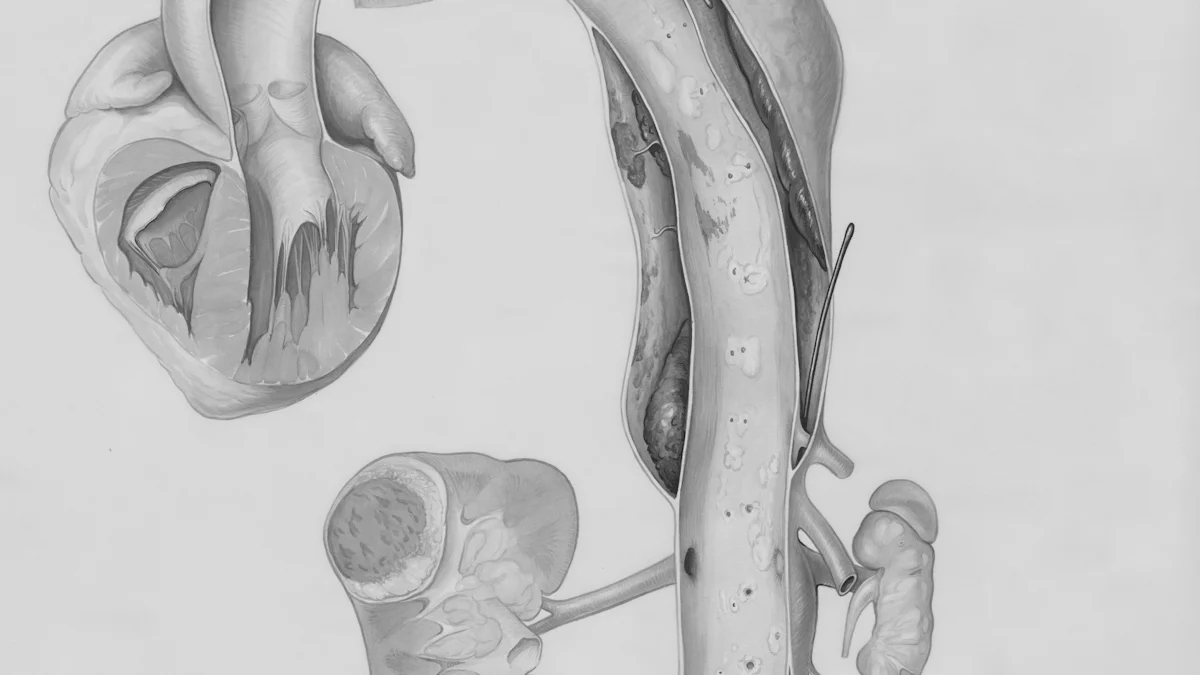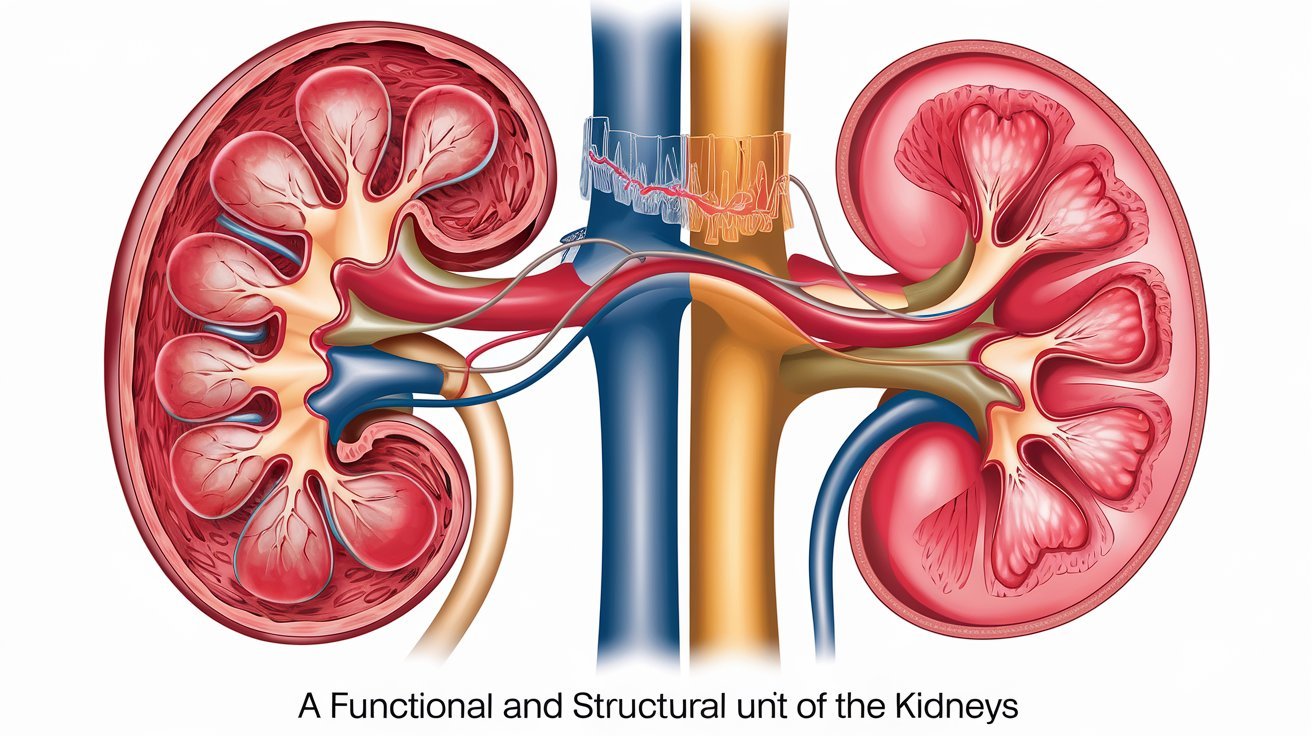- The nephron is the kidney’s functional and structural unit, with each kidney housing about one million.
- It consists of the renal corpuscle and renal tubule.
- The renal corpuscle, featuring the glomerulus, initiates blood filtration.
- The renal tubule reabsorbs essential substances and excretes waste.
- The glomerulus filters blood, pushi
- The nephron is the kidney’s functional and structural unit, with each kidney housing about one million.
- It consists of the renal corpuscle and renal tubule.
- The renal corpuscle, featuring the glomerulus, initiates blood filtration.
- The renal tubule reabsorbs essential substances and excretes waste.
- The glomerulus filters blood, pushing out water and salts while retaining proteins.
- The renal tubule reabsorbs nutrients like glucose and amino acids.
- The Loop of Henle concentrates urine, conserving water and salts.
- The distal tubule and collecting duct adjust salt and water levels, finalizing urine concentration.
- Nephrons regulate blood pressure through hormones like ADH and aldosterone.
- ADH increases water reabsorption, boosting blood volume and pressure.
- Aldosterone aids sodium retention, raising pressure.
- Nephrons also produce renin, triggering a chain reaction that tightens blood vessels, further increasing pressure.
- Nephrons maintain fluid balance by reabsorbing water and cleaning the body by removing waste.
- The glomerulus filters waste, and the renal tubule converts it into urine, preventing toxin buildup and ensuring overall health.
- Chronic Kidney Disease (CKD) gradually damages nephrons, reducing their ability to clean blood.
- Acute Kidney Injury (AKI) occurs suddenly, often due to dehydration or infections, leading to rapid waste accumulation.
- Early detection and treatment are crucial for managing these
The nephron is the functional and structural unit of kidneys. Each kidney contains about one million nephrons, which are responsible for cleaning blood and producing urine. The nephron consists of two main sections: the renal corpuscle and the renal tubule. The renal corpuscle includes the glomerulus, which initiates blood filtration. The renal tubule reabsorbs necessary substances and excretes waste. Nephrons play a crucial role in regulating water and other substances in the body. As people age, they may have fewer nephrons, potentially affecting kidney function.
Anatomy of the Nephron

Renal Corpuscle
Structure of the Glomerulus
The glomerulus is a group of tiny blood vessels. These vessels act as a filter. Blood flows through them to remove waste. Special cells help this process happen.
Function of the Glomerulus
The glomerulus starts filtering blood. Blood enters with pressure, pushing out water and salts. It keeps big things like proteins inside.
Renal Tubule
Proximal Convoluted Tubule
This tubule takes back important nutrients. It gets glucose, amino acids, and ions. Water is also reabsorbed to keep balance.
Loop of Henle
The Loop of Henle makes urine stronger. It creates a gradient in the kidney. This helps save water and salts.
Distal Convoluted Tubule
This tubule adjusts salt and water levels. It balances electrolytes in the body. Extra waste goes into the urine here.
Collecting Duct
The collecting duct gathers urine from nephrons. It makes urine more concentrated. Water reabsorption is controlled here by hormones.
Function of the Nephron
Filtration Process
Role of the Glomerulus in Filtration
The glomerulus starts filtering blood. Blood enters with force. This force pushes liquid into a capsule. It filters around 150 liters daily. Most fluid goes back to the body. Only waste and extra water become urine.
Reabsorption and Secretion
Mechanisms in the Renal Tubule
The tubule takes back important stuff. Sugar, proteins, and ions return to blood. The Loop of Henle makes urine stronger. It helps save water and salts using a gradient. Hormones like aldosterone help this work.
Importance in Waste Excretion
Nephrons help remove waste. The distal tubule changes salt and water levels. This keeps electrolytes balanced. The collecting duct finishes making urine strong. Hormones control water here to stop toxin buildup.
Nephron’s Role in Homeostasis
Blood Pressure Control
The nephron helps keep blood pressure steady. Hormones work with the nephron to do this. ADH and aldosterone are key hormones. ADH makes the nephron save water, boosting blood volume and pressure. Aldosterone helps the body hold onto sodium. More sodium means more water, raising pressure.
The nephron also makes renin, starting a chain reaction. Renin changes angiotensinogen to angiotensin I. Angiotensin I becomes angiotensin II. This tightens blood vessels, increasing pressure. These steps show how important nephrons are for blood pressure.
Electrolyte Balance
Nephrons also balance electrolytes like sodium and potassium. These are needed for nerves and muscles to work well. The Na-K-ATPase enzyme is crucial here. It moves sodium out of cells and potassium in.
Nephrons adjust sodium by reabsorbing it in parts of the tubule. Most sodium is taken back in the proximal tubule. The distal tubule fine-tunes it further. Potassium is put into urine by the distal tubule and collecting duct, keeping electrolytes balanced for health.
Importance of Nephrons in Kidney Function
Keeping Fluid Balance
Water Reabsorption
Nephrons help keep the body’s fluid balance. Each nephron cleans blood and takes back water to keep us hydrated. The renal tubule moves water into the blood. The Loop of Henle helps water move well by making a gradient. Staying hydrated is good for kidneys and health.
Cleaning the Body
Getting Rid of Waste
Nephrons clean by taking out waste from blood. The glomerulus filters waste, and the renal tubule turns it into urine. This stops bad stuff from building up in our bodies. Special transporters help remove waste well. Nephrons keep our insides clean, helping us stay healthy.
Common Problems with Nephrons
Long-term Kidney Disease
Effects on Nephron Work
Long-term Kidney Disease (CKD) hurts nephrons slowly. CKD lowers the count of working nephrons. Fewer nephrons clean blood less well. Waste builds up because nephrons don’t work right. CKD makes you tired and swollen. Finding it early can slow it down. Regular doctor visits check kidney health.
Sudden Kidney Injury
Reasons and Results
Sudden Kidney Injury (AKI) happens fast. AKI comes from being very thirsty or infections. Some drugs also cause AKI. Nephrons fail to work during AKI. Waste quickly fills the blood. AKI causes confusion and less pee. Quick medical help is needed for AKI. Treatment aims to fix kidney work.
New Discoveries in Nephron Study
New Ways to Help
Fixing with Science
Scientists are finding ways to fix broken nephrons. They use special cells to make new kidney parts. These parts can take over for the ones that don’t work. This could help kidneys get better. This science gives hope to people with bad kidney problems. Studies keep trying to make these methods safer and better.
Looking Ahead
Making Fake Nephrons
Scientists are creating fake nephrons like real kidneys. These machines clean blood and handle waste. Fake nephrons might help people whose kidneys fail. Experts aim to make them work well and cost less. Future progress might let many use them in health care. The aim is to improve life for those with kidney troubles.
Conclusion
Nephron’s Job Recap
Main Jobs Summary
Nephrons are key parts of kidneys. Each nephron cleans blood, takes back needed stuff, and makes urine. This keeps the body balanced. The glomerulus starts cleaning by taking out waste from blood. The renal tubule takes back nutrients and balances salts. These jobs keep blood pressure and volume right. Millions of nephrons work together to keep the body steady.
Thoughts on Kidney Health
Keeping Nephrons Safe
Keeping nephrons healthy is important for feeling good. Good nephrons clean waste, control fluids, and balance salts. Hurt nephrons can cause kidney problems and other issues. Regular doctor visits and a healthy life help kidneys work well. Protecting nephrons helps kidneys do their important jobs right.
Nephrons are key parts of how kidneys work. Each nephron cleans blood, takes back needed things, and makes urine. This keeps water and other stuff in balance in the blood. Nephrons help keep the body steady by controlling blood amount and pressure. Keeping nephrons healthy helps kidneys work well. Going to the doctor often and living healthily helps save nephrons. Caring for nephrons lets kidneys do their important jobs right.

